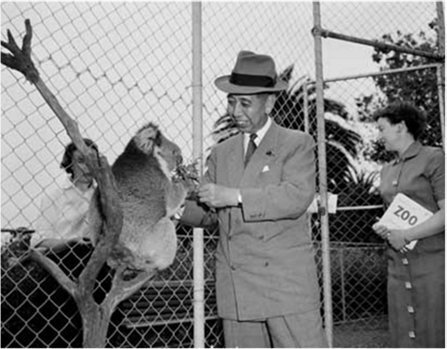On this day, 29 November 1957, Japanese Prime Minister Nobusuke Kishi arrives in Australia for an historic tour, having accepted a personal invitation from Menzies. Kishi was the first Japanese leader to visit Australia, and his presence and speeches marked an important moment in the post-war reconciliation between the two formerly belligerent nations.
The visit, which came on the back of the signing of the highly significant 1957 Commerce Agreement and Menzies’s earlier support for the lenient Japanese Peace Treaty signed in 1951, was not without controversy. A statement given by a representative of the Retired Servicemen’s League described news of Kishi’s visit as ‘disturbing’ and suggested that while ‘hates should not continue forever’:
‘Mr. Menzies may be hard-pressed to convince a mother or a wife whose son or husband was bayoneted to a tree for no better reason than that the Nips wanted practice, that his actions should be acceptable to them. The Japs were so well informed during the war that it seems hardly likely that Hirohito knew nothing of the atrocities his men were committing, but I have heard of no record whereby he ordered them to desist.’
As this extract indicates, the fact that the Japanese Emperor Hirohito had largely escaped punishment for Japan’s wartime atrocities (other than being forced to renounce any former claims to divinity and submit to a new explicitly pacifist constitution) was a particularly sore point for those opposed to fostering closer ties between Australia and Japan. Kishi had been a member of the Japanese war cabinet, and could not readily be separated from what had occurred. The left-leaning Tribune described him as a representative of ‘the monopoly capitalist and aristocratic rulers of Japan’, while even the NSW Government only agreed to entertain his party ‘with some hesitation’.
Even during the war Menzies had argued that animosities towards the enemy must neither be racially based nor enduring, and he was willing to deal with the severe criticism he received for his post-war pro-Japan policies because he felt that they were in the national interest. Menzies had gone so far as to directly dine with Emperor Hirohito at the Imperial Palace during the historic first official visit by an Australian Prime Minister to Japan earlier in April 1957, which Kishi was now reciprocating (Menzies had visited Japan earlier in the decade to meet with Australian troops committed to the Korean War, but this had not had the same formalities surrounding it).
Menzies rejected a call from a Labor MP to prevent Kishi from laying a wreath at the National War Memorial in Canberra – though this did not stop a protestor yelling at Kishi and placing a seven-page document listing Japanese crimes committed against Australian prisoners of war next to his wreath. The protestor was identified as R.H. Greenish, a former Liberal candidate who married the widowed wife of a soldier who had been beheaded by his captors.
The highlight of the visit was a luncheon given at Parliament House, where Kishi formally apologised on behalf of his nation for the war. Speaking in Japanese, ‘but with obvious emotion’ he told his audience of MPs and Senators that:
‘It is over 12 years since hostilities ceased and over six years since the formal conclusion of peace, but notwithstanding that passage of time it is my official duty, and my personal desire, to express to the people of Australia our heartfelt sorrow for what occurred in the war…. I think it will not surprise you to know that there is something of which I am acutely conscious at this moment, standing here in these surroundings. It is this — although there has been a long tradition of friendship between Australia and Japan, including the First World War and our cherished association with your immortal Anzacs, there occurred four years of tragic interruption in that friendship… In the years since the war ended, Japan has transformed herself into a fully-fledged democracy and it is encouraging to find so much evidence that Australia appreciates and supports Japan’s efforts in this direction… I must not let this golden opportunity pass of thanking the Government and people of Australia for having supported so warmly our admission to the United Nations and more recently our election to the Security Council. Also with your support, in a humble way we are partners in the Colombo Plan. As your Prime Minister has said in the past, we must learn to live together in amity, for live together we must. It is a source of admiration to me that the traditional British characteristic of common sense is asserting itself here in finding a way’.
Menzies responded with a toast to Kishi, ‘We have given great thought to these matters; but the attendance of such a great company of members of the Australian Parliament, representative of all parties, is the best assurance that we have reached the wise conclusion that it is better some times to hope than always to remember’. Opposition Leader H.V. Evatt likewise complimented Kishi on leading a ‘crusade for peace’ – likely referring to the Prime Minister’s outspoken call to end all nuclear weapons testing, including explicitly British tests then being conducted near Christmas Island.
Further Reading:
This brief account of the visit has been pieced together from articles in The Canberra Times.
Sign up to our newsletter
Sign up for our monthly newsletter to hear the latest news and receive information about upcoming events.


